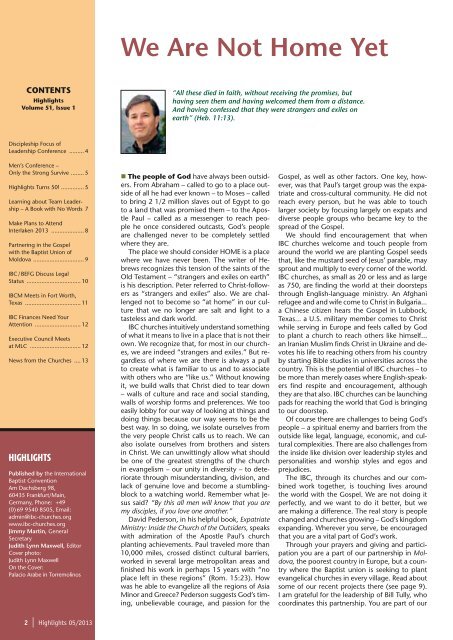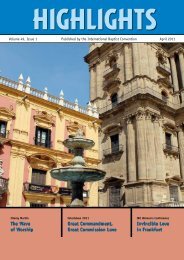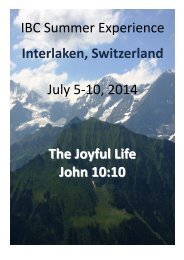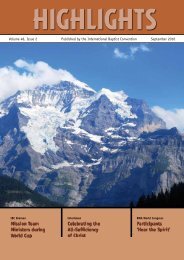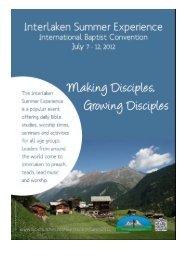2013 May.pdf - International Baptist Convention
2013 May.pdf - International Baptist Convention
2013 May.pdf - International Baptist Convention
Create successful ePaper yourself
Turn your PDF publications into a flip-book with our unique Google optimized e-Paper software.
We Are Not Home Yet<br />
Contents<br />
Highlights<br />
Volume 51, Issue 1<br />
“All these died in faith, without receiving the promises, but<br />
having seen them and having welcomed them from a distance.<br />
And having confessed that they were strangers and exiles on<br />
earth” (Heb. 11:13).<br />
Discipleship Focus of<br />
Leadership Conference .......... 4<br />
Men’s Conference –<br />
Only the Strong Survive ......... 5<br />
Highlights Turns 50! .............. 5<br />
Learning about Team Leadership<br />
– A Book with No Words .7<br />
Make Plans to Attend<br />
Interlaken <strong>2013</strong> ..................... 8<br />
Partnering in the Gospel<br />
with the <strong>Baptist</strong> Union of<br />
Moldova ................................ 9<br />
IBC / BEFG Discuss Legal<br />
Status .................................. 10<br />
IBCM Meets in Fort Worth,<br />
Texas ................................... 11<br />
IBC Finances Need Your<br />
Attention ............................. 12<br />
Executive Council Meets<br />
at MLC ................................ 12<br />
News from the Churches ..... 13<br />
Highlights<br />
Published by the <strong>International</strong><br />
<strong>Baptist</strong> <strong>Convention</strong><br />
Am Dachsberg 98,<br />
60435 Frankfurt/Main,<br />
Germany, Phone: +49<br />
(0) 69 9540 8505, Email:<br />
admin@ibc-churches.org<br />
www.ibc-churches.org<br />
Jimmy Martin, General<br />
Secretary<br />
Judith Lynn Maxwell, Editor<br />
Cover photo:<br />
Judith Lynn Maxwell<br />
On the Cover:<br />
Palacio Arabe in Torremolinos<br />
• The people of God have always been outsiders.<br />
From Abraham – called to go to a place outside<br />
of all he had ever known – to Moses – called<br />
to bring 2 1/2 million slaves out of Egypt to go<br />
to a land that was promised them – to the Apostle<br />
Paul – called as a messenger to reach people<br />
he once considered outcasts, God’s people<br />
are challenged never to be completely settled<br />
where they are.<br />
The place we should consider HOME is a place<br />
where we have never been. The writer of Hebrews<br />
recognizes this tension of the saints of the<br />
Old Testament – “strangers and exiles on earth”<br />
is his description. Peter referred to Christ-followers<br />
as “strangers and exiles” also. We are challenged<br />
not to become so “at home” in our culture<br />
that we no longer are salt and light to a<br />
tasteless and dark world.<br />
IBC churches intuitively understand something<br />
of what it means to live in a place that is not their<br />
own. We recognize that, for most in our churches,<br />
we are indeed “strangers and exiles.” But regardless<br />
of where we are there is always a pull<br />
to create what is familiar to us and to associate<br />
with others who are “like us.” Without knowing<br />
it, we build walls that Christ died to tear down<br />
– walls of culture and race and social standing,<br />
walls of worship forms and preferences. We too<br />
easily lobby for our way of looking at things and<br />
doing things because our way seems to be the<br />
best way. In so doing, we isolate ourselves from<br />
the very people Christ calls us to reach. We can<br />
also isolate ourselves from brothers and sisters<br />
in Christ. We can unwittingly allow what should<br />
be one of the greatest strengths of the church<br />
in evangelism – our unity in diversity – to deteriorate<br />
through misunderstanding, division, and<br />
lack of genuine love and become a stumblingblock<br />
to a watching world. Remember what Jesus<br />
said “By this all men will know that you are<br />
my disciples, if you love one another.”<br />
David Pederson, in his helpful book, Expatriate<br />
Ministry: Inside the Church of the Outsiders, speaks<br />
with admiration of the Apostle Paul’s church<br />
planting achievements. Paul traveled more than<br />
10,000 miles, crossed distinct cultural barriers,<br />
worked in several large metropolitan areas and<br />
finished his work in perhaps 15 years with “no<br />
place left in these regions” (Rom. 15:23). How<br />
was he able to evangelize all the regions of Asia<br />
Minor and Greece Pederson suggests God’s timing,<br />
unbelievable courage, and passion for the<br />
Gospel, as well as other factors. One key, however,<br />
was that Paul’s target group was the expatriate<br />
and cross-cultural community. He did not<br />
reach every person, but he was able to touch<br />
larger society by focusing largely on expats and<br />
diverse people groups who became key to the<br />
spread of the Gospel.<br />
We should find encouragement that when<br />
IBC churches welcome and touch people from<br />
around the world we are planting Gospel seeds<br />
that, like the mustard seed of Jesus’ parable, may<br />
sprout and multiply to every corner of the world.<br />
IBC churches, as small as 20 or less and as large<br />
as 750, are finding the world at their doorsteps<br />
through English-language ministry. An Afghani<br />
refugee and and wife come to Christ in Bulgaria...<br />
a Chinese citizen hears the Gospel in Lubbock,<br />
Texas... a U.S. military member comes to Christ<br />
while serving in Europe and feels called by God<br />
to plant a church to reach others like himself...<br />
an Iranian Muslim finds Christ in Ukraine and devotes<br />
his life to reaching others from his country<br />
by starting Bible studies in universities across the<br />
country. This is the potential of IBC churches – to<br />
be more than merely oases where English-speakers<br />
find respite and encouragement, although<br />
they are that also. IBC churches can be launching<br />
pads for reaching the world that God is bringing<br />
to our doorstep.<br />
Of course there are challenges to being God’s<br />
people – a spiritual enemy and barriers from the<br />
outside like legal, language, economic, and cultural<br />
complexities. There are also challenges from<br />
the inside like division over leadership styles and<br />
personalities and worship styles and egos and<br />
prejudices.<br />
The IBC, through its churches and our combined<br />
work together, is touching lives around<br />
the world with the Gospel. We are not doing it<br />
perfectly, and we want to do it better, but we<br />
are making a difference. The real story is people<br />
changed and churches growing – God’s kingdom<br />
expanding. Wherever you serve, be encouraged<br />
that you are a vital part of God’s work.<br />
Through your prayers and giving and participation<br />
you are a part of our partnership in Moldova,<br />
the poorest country in Europe, but a country<br />
where the <strong>Baptist</strong> union is seeking to plant<br />
evangelical churches in every village. Read about<br />
some of our recent projects there (see page 9).<br />
I am grateful for the leadership of Bill Tully, who<br />
coordinates this partnership. You are part of our<br />
2 | Highlights 05/<strong>2013</strong>


